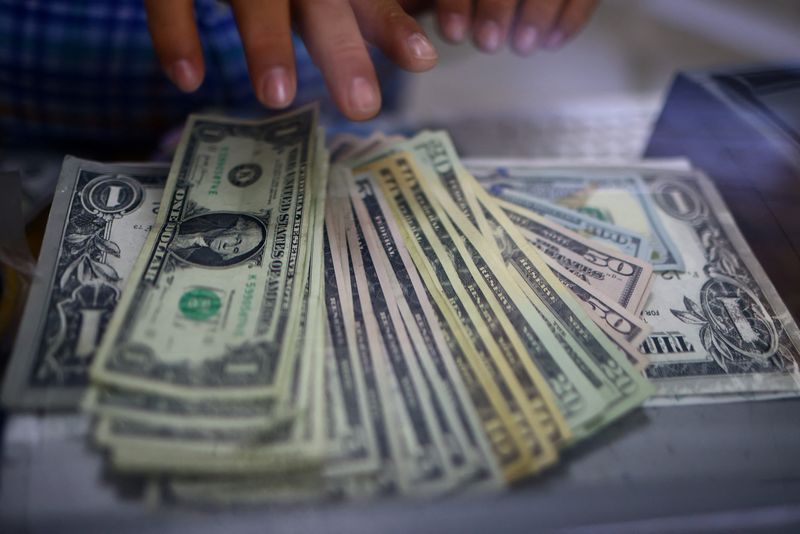By Saqib Iqbal Ahmed and Amanda Cooper
NEW YORK (Reuters) - The dollar rose to a two-week high against the euro on Tuesday as traders braced for a data-heavy week, including Friday's U.S. payrolls report that could shape the path of interest rate cuts from the Federal Reserve.
Investor focus this week will squarely be on the U.S. payrolls data after Fed Chair Jerome Powell last month endorsed an imminent start to interest rate cuts in a nod to concern over a softening in the labour market.
Economists surveyed by Reuters expect an increase of 165,000 U.S. jobs in August, up from a rise of 114,000 in July.
Ahead of that, job openings data on Wednesday and the jobless claims report on Thursday will be in the spotlight.
A gauge of U.S. manufacturing edged up last month from an eight-month low in July amid improvement in employment, but the overall trend continued to point to subdued factory activity, data on Tuesday showed.
"On the whole, the report should allay some concerns that the market retains over the U.S. growth outlook," said Michael Brown, senior research strategist at Pepperstone.
"Any significant moves on the back of the release are likely to be relatively limited in nature, ahead of the wider services gauge being released on Thursday, and, of course, with all eyes remaining on Friday's key jobs report, as the main determinant of whether the FOMC will plump for a 25 basis points, or a 50 basis points, cut at the September meeting," Brown said.
Markets are pricing in a 63% chance of a 25 basis points (bps) cut when the Fed meets on Sept. 17 and 18, with a 37% probability of a 50-bps cut, CME FedWatch tool showed. Some 100 bps of cuts are priced in all for the year.
The euro was 0.3% lower against the dollar at $1.1043 on Tuesday, after slipping to a two-week low of $1.103375 earlier in the session.
The dollar, a traditional safe haven, also appeared to be benefiting from a flight to safety as stocks and riskier currencies sold off on Tuesday.
AUGUST SLIDE
Incoming data will also offer clues to whether the dollar's August slide was overdone or whether more losses are in store for the buck.
"A weaker jobs report would likely drive the dollar lower," Fawad Razaqzada, Market Analyst at StoneX, said in a note.
The Dollar Index, which measures the U.S. currency's strength against six major peers, fell 2.2% in August, its worst monthly showing since November. On Tuesday, the index was up 0.2% at 101.84.
The dollar fell 0.7% against the yen on Tuesday to 145.89 yen after media reports cited the Bank of Japan governor reiterating in a document submitted to a government panel on Tuesday that the central bank would keep raising interest rates if the economy and inflation performed as policymakers currently expect.
Japan's yen has staged a 10% rally in the last two months - aided in part by official intervention.
"The governor of the Bank of Japan wrote a letter to the Japanese government, explaining the decision to raise rates in July. He also said that the BOJ will continue to raise interest rates ‘if the economy and prices perform as expected’," XTB research director Kathleen Brooks said.
"The yen is higher on the back of these comments," she said.
The pound eased against the dollar on Tuesday as investors booked some profit on sterling's August rally, its largest monthly gain in 10 months. The British currency was last down 0.4% at $1.30885.

The firmer U.S. dollar and general risk aversion weighed on the Australian and New Zealand dollars, which fell on Tuesday after ending August with hefty gains.